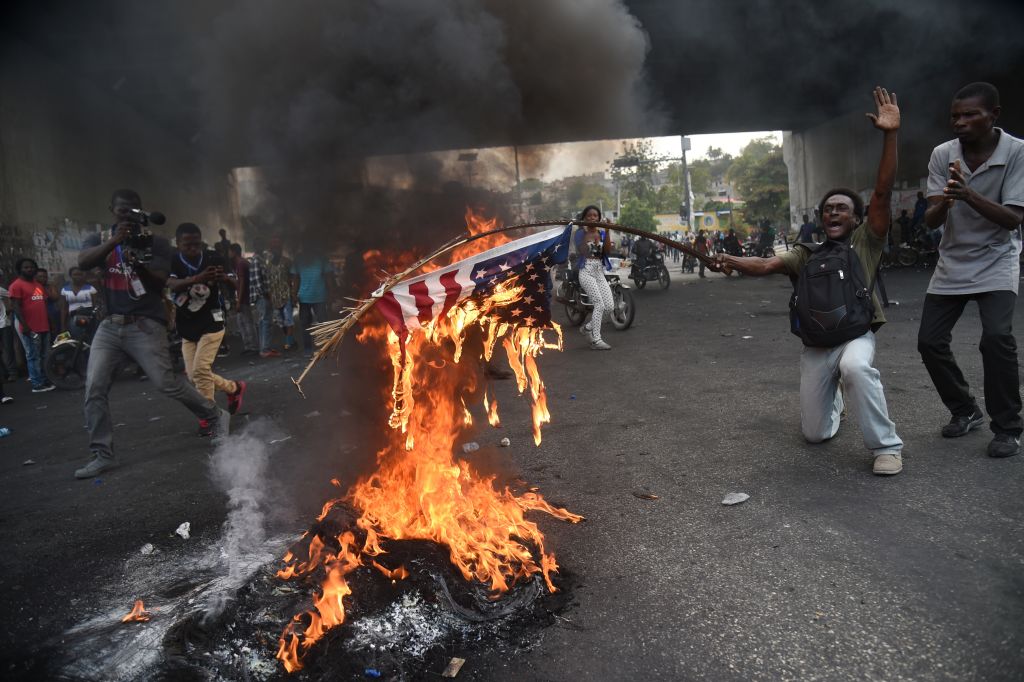Protests broke out in Port-au-Prince, Haiti, as demonstrators are frustrated with the current government under Jovenel Moïse.
Beginning February 7, violence increased throughout the week without any sign of a resolution. Several people have died in the protests, as violent clashes between police and protestors persisted. During the protests, Haitian police arrested five American foreign nationals, along with one Haitian and two other travelers for carrying armed weapons, drones and satellite phones in their vehicles. It is believed that the Americans had military backgrounds. The U.S. Department of State has also issued a level-four warning to travelers, saying “Do not travel to Haiti due to crime and civil unrest.”
The police force also increased their numbers by utilizing prison guards to push back against demonstrators. The lack of prison guards in Haitian correctional facilities ultimately prompted a breakout of 78 inmates, which has heightened the need for national security. With the level of violence on the rise and the physical and emotional destruction of Haitian neighborhoods in tow, there is still very little hope of giving Haitians what they want from their government.
The protests began when the Haitian Senate conducted an investigation into Haitian President Jovenel Moïse’s connection to missing development funds that were given to Haiti through a deal with Venezuela in 2007 via PetroCaribe, an alliance between the South American country and various Caribbean nations, providing them with oil at a very low price. Under the PetroCaribe oil agreement, all Haiti had to do was supply 60 percent of the payment up front. If oil prices remained higher than $40 a barrel, Haiti would be able to pay Venezuela back over the course of 25 years one percent interest. The savings from the discounted oil prices were meant to be used toward development projects in Haiti.
The PetroCaribe fund was especially needed for reconstruction following the back-to-back natural disasters that devastated the country; the 2010 earthquake and Hurricane Sandy in 2012. In both situations, former Presidents René Préval and Michel Martelly allowed their Prime Ministers Jean-Max Bellerive and Laurent Lamothe to use money from the PetroCaribe fund, after declaring them as national emergencies. However, Haitians say the money was never used for development purposes, as many of the damage from the natural disasters are still visible.
Although a foreign aid supporter, the United States has faced criticism from Haitians for their possible involvement in the corruption. Former Secretary of State Hillary Clinton allegedly helped Martelly get elected to office. She also helped finance over $220 million for the construction of an industrial park, which evicted 366 farmers from the land. In return, 20,000 jobs were promised to Haitians. The United States government also sent Haiti over $3 billion in disaster relief following Hurricane Sandy, Hurricane Matthew, and the 2010 earthquake. About $33 million of that amount was used to restore the electoral process between 2015 and 2017, which lent its hand in getting Moïse elected to the presidency in 2016.
Suspicions of corruption continued to rise when the Haitian Senate released an investigative report in 2017, which found that several government officials had “mishandled” $2 billion of the PetroCaribe fund. In the report, the Haitian Senate specifically named Bellerive and Lamothe as orchestrators of the corruption, as well as several owners of Haitian and Dominican firms that were paid millions to reconstruct buildings and roads destroyed in the earthquake. The report also names Moïse in cooperation with the embezzlement, due to money received by one of his private firms that was also contracted to do reconstruction work.
Haitians similarly stormed the streets to protest last year when the government raised fuel prices by roughly 50 percent, due to a deal reached with the International Monetary Fund (IMF). The deal with the IMF was to secure about $96 million in funds by agreeing to raise fuel prices to make up for the loss of over $160 million in revenue. After the violent protests ensued and lasted for days, the deal was reversed, leading to the resignation of Haitian Prime Minister Jack Guy Lafontant.
Frustrated with the recent findings and the lack of economic progress, Haitians are now calling for Moïse to resign, as well. However, Moïse announced in a televised broadcast that he will not step down. Instead, he will work on economic reform measures to restore transparency and trust in the government. During the protests, Haitian police arrested five American foreign nationals along with one Haitian and two other travelers for carrying armed weapons, drones, and satellite phones in their vehicles. It is believed that the Americans had military backgrounds. The US Department of State has now issued a level 4 warning to travelers, saying "Do not travel to Haiti due to crime and civil unrest." With the death toll slowly rising, many are worried that the protests will continue.
Now, check this out:
4 Dead and 78 Prisoners Escaped As Haiti Enters Its Second Week Of Turmoil
Anti-Government Corruption Protests Leave At Least Six Dead
Everything You Need To Know About The Ongoing Protests In Haiti

